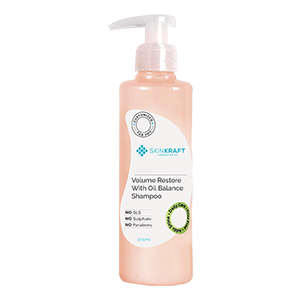Have you noticed a change in your hair texture lately? Especially since you moved into a new city/home, has it become worse? If your hair feels too greasy even in the winter, the water you use could be the culprit!
Hard water causes dry, damaged and frizzy hair. Frequent hair wash in hard water may even weigh your hair down or result in hair fall. Let us take a look at the effects of hard water on your hair in detail.
Highlights:
What Is Hard Water?
Hard water is basically water that is high in minerals like calcium and magnesium (1). The excess minerals are responsible for clogging your home’s pipes and leaving soap residue or scum on your skin/hair even after rinsing. This can lead to certain hair issues.
Signs that you may be using hard water

- If you tend to observe stains on your clothes after they have been washed, your water is probably hard.
- Everytime you wash your hands, if you’re using hard water, you may notice the formation of scum. This happens when soap reacts with calcium present in hard water (2).
- Calcium tends to leave spots on utensils. This may be a sign that you’re using hard water.
What Does Hard Water Do To Your Hair?
The effects of hard water on your hair can be quite unpleasant (3). Here is what hard water can do to your hair, if used too frequently:
1. Makes It Look Greasy
Hard water contains minerals that get deposited on your hair. These deposits can cause your hair to feel sticky, dirty and may even weigh it down. You may also develop split ends and your hair may be more prone to breakage.
2. Color Fading
If you’ve got your hair colored recently, you may even notice some fading. High amounts of iron work as an oxidizer, causing your color to fade away. You may also tend to notice that your reds may turn into hues of orange.
3. Unmanageable Hair
Constantly washing your hair with shampoo can cause it to get dry and strip away its essential oils and moisture. This causes it to appear frizzy, dull and tangled that can even make it quite difficult to manage.
4. Dry, Damaged Hair
Mineral deposits may cause your hair to weigh down and feel extra greasy. This may require you to wash your hair frequently with shampoo. Shampoo tends to remove essential oils and moisture from your hair, causing it to feel dry and frizzy. Eventually, it may cause it to break.
5. Thinning Of Your Hair
Build-up of minerals may even clog the pores of your scalp, interfering with the growth of new hair strands. Your hair can fall flat after a wash in hard water.
How Can You Reverse The Effects Of Hard Water On Your Hair?
1. Soften Your Water
You can do this by installing a water softening system. This will prevent the minerals and other compounds from coming through, making the water softer and better for the health of your hair.
You can even use a shower filter, which is economical and easier to install. However, to ensure its efficacy, you should change it after every 6 months.
2. Chelating Shampoos
A chelating shampoo fights the adverse effects of hard water and leaves your scalp feeling lighter, cleaner and free of grease.
These work by leaving molecules onto your hair and scalp that lift up the dirt and residue left behind.
Investing in a chelating shampoo can help reverse the effects of hard water on your hair. These help in eliminating mineral build-up and product residue. They leave your hair feeling cleaner, lighter and even free of grease.
However, chelating shampoos can be a costly affair and not everybody may be able to afford it.
3. Demineralizing Products
Demineralizing shampoos are specifically tailored to lift up the mineral residue left behind by hard water on your hair. Their results are instant and you will be able to notice differences in the shine and softness of your hair after 2-3 washes.
Home Remedies To Reverse The Effects Of Hard Water On Your Hair
1. Apple Cider Vinegar
Add a few drops of apple cider vinegar to warm water and use it to rinse your hair. Vinegar removes mineral build-up from your hair and makes it softer and lighter (4). It also prevents hair color from fading.
2. Lemon
Lemon works by removing excess residue from your hair and brightens it. It also helps in keeping your hair light and soft.
3. Rainwater
You can even use rainwater to wash your hair. It is usually free of minerals and naturally soft.
Note:
Demineralizing products can be used once a week after you shampoo your hair. Leaving-in the product for about 10-15 minutes is recommended. After rinsing the product off, you can continue to use your conditioner.
Can Hard Water Cause Hair Loss?
Hard water can weaken your hair (5). It may restrict blood flow to your follicles. This can interfere with the growth of new hair strands. Hard water does not cause permanent hair loss and this can be rectified by changing your water system or using products that reverse its effects.
Wrapping Up
Hard water can cause a mineral build-up on your hair, making it feel extra greasy even after a wash. It may also contribute to dry, damaged hair due to frequent washing. Hard water can be rectified by changing the water system of your house or by attaching a filter to your shower. You can even use products like chelating shampoos and other demineralizing products that help in reducing the damage caused to your hair by hard water.
Recommended Products
Was this Article helpful?
- Least helpful
- Most helpful











